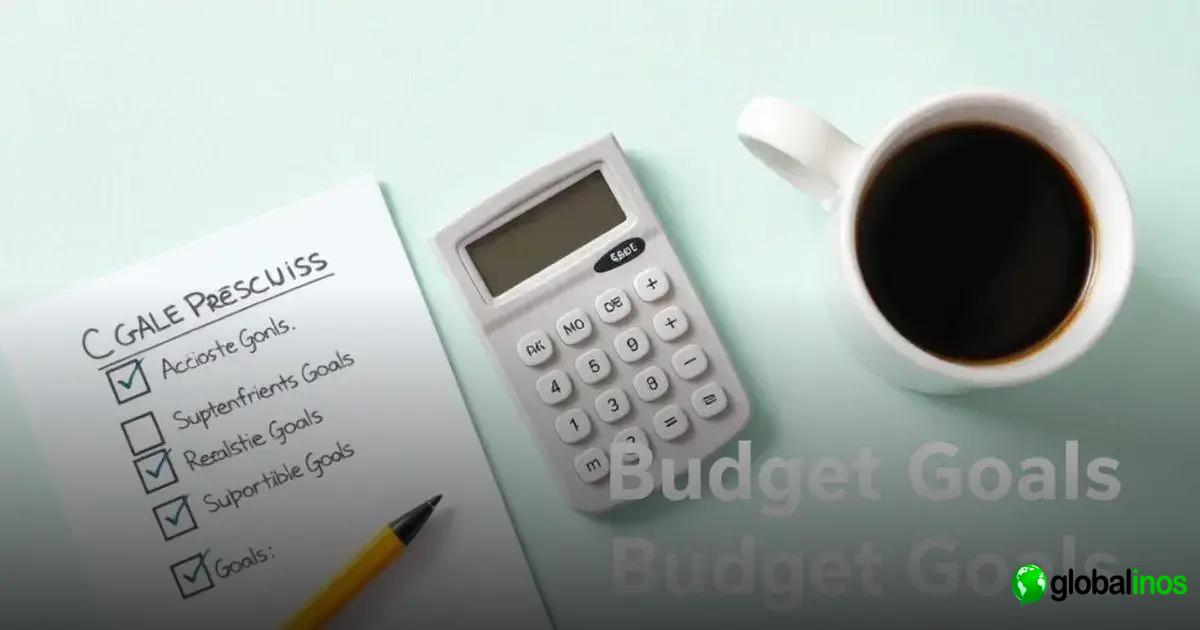Smart budgeting tips for everyday expenses can transform the way you manage your money. It’s all about making informed choices, setting priorities, and ensuring every dollar works toward your goals. With the right strategies, financial freedom doesn’t have to feel out of reach.
Budgeting isn’t just for experts or accountants—it’s for anyone who wants to spend smarter and save with purpose. Whether you’re trying to build savings, pay down debt, or prepare for unexpected expenses, smart budgeting can give you clarity and confidence in your financial journey.
Ready to take control of your finances? Keep reading to uncover practical tips that will help you simplify spending, cut unnecessary costs, and build a stable financial foundation.
Understanding Smart Budgeting
Understanding smart budgeting is the first step toward managing your finances effectively. It involves creating a plan that helps you allocate your income towards different expenses while saving for future goals. Incorporating Smart budgeting tips for everyday expenses can make this process even easier and more efficient.
What is Smart Budgeting?
Smart budgeting means making conscious decisions about how to spend and save your money each month. This method helps prioritize essential expenses while reducing unnecessary spending. It’s not about depriving yourself but about making informed choices.
Why is Budgeting Important?
Budgeting helps you see where your money goes each month. By tracking your expenses, you can identify areas to cut back and increase your savings. This can lead to less stress and more financial security. Applying Smart budgeting tips for everyday expenses can streamline this process by providing simple strategies for spending control.
Basic Steps for Smart Budgeting
- List Your Income: Start by writing down how much money you bring home each month.
- Track Your Expenses: Keep a record of what you spend. Include everything from rent to groceries to entertainment.
- Set Your Goals: Decide what you want to save for, whether it’s an emergency fund, a vacation, or a new car.
- Create Your Budget: Based on your income and expenses, design a budget that allocates specific amounts for each category.
- Stick to It: Review your spending often to ensure you stay within your budget.
Benefits of Understanding Smart Budgeting
Grasping the principles of smart budgeting empowers you to achieve financial freedom. It helps you to:
- Live within your means.
- Prepare for unexpected expenses.
- Reduce financial stress.
- Reach your financial goals faster.
By following Smart budgeting tips for everyday expenses, you can make smarter financial choices and build a secure future without unnecessary sacrifices.
Setting Realistic Budget Goals

Setting realistic budget goals is crucial for effective money management. Without clear goals, it’s easy to overspend or lose track of your financial health. Here are some key strategies to help you establish achievable budget goals that fit your lifestyle.
Define Your Financial Goals
Start by determining what you want to achieve with your budget. Consider both short-term and long-term goals. Short-term goals might include saving for a vacation or paying down a credit card, while long-term goals could involve buying a house or saving for retirement.
Incorporate Smart budgeting tips for everyday expenses into your plan to ensure all goals align with your financial habits.
Assess Your Current Situation
Review your income and expenses. This will give you a clear picture of where your money is going. Identify fixed expenses like rent and variable expenses like dining out. Understanding this will help you make informed decisions about your spending.
Make Your Goals S.M.A.R.T.
Apply the S.M.A.R.T. criteria to your goals:
- Specific: Clearly define what you want to achieve.
- Measurable: Ensure you can track your progress.
- Achievable: Set goals that are realistic based on your income and expenses.
- Relevant: Goals should matter to your overall financial plan.
- Time-bound: Set a timeline for achieving each goal.
Prioritize Your Goals
Not all goals are equally important. Focus on the most critical goals first. For example, building an emergency fund might take precedence over a vacation fund. Prioritizing helps manage resources effectively and keeps you motivated as you achieve milestones.
Track Your Progress
Regularly review your goals and progress. This can involve checking your savings, comparing actual spending to your budget, and adjusting your goals as necessary. Tracking lets you celebrate successes and recalibrate if you’re falling behind. Apply Smart budgeting tips for everyday expenses to your regular reviews to stay on track.
Be Flexible
Life can be unpredictable, so it’s important to be flexible. Adjust your goals as your financial situation changes. For instance, if you receive a pay raise, consider allocating funds to both savings and enjoying life.
Tracking Your Daily Expenses
Tracking your daily expenses is a vital part of smart budgeting. By monitoring where your money goes, you can make better financial choices. Here are effective ways to keep track of your spending.
Why Tracking Expenses is Important
Keeping an eye on your daily expenses helps you understand your spending habits. This can reveal patterns that may not be obvious at first. When you know where your money is going, you can identify areas where you might cut back.
Start with a Daily Log
Begin by keeping a daily expenses log. Write down every purchase you make. You can use a notebook, spreadsheet, or expense-tracking app. Be consistent and include all expenses, no matter how small.
Use Expense Tracking Apps
Budgeting apps can simplify the tracking process. Many apps allow you to connect your bank accounts, automatically categorizing your expenses. Some popular options include Mint, YNAB (You Need a Budget), and PocketGuard.
Categorize Your Expenses
Organize your expenses into categories like food, housing, entertainment, and transportation. This will give you a clearer picture of where your money is spent each month. You can create a pie chart or bar graph for a visual representation of your spending.
Review Regularly
Set aside time each week to review your expenses. Look at your log and compare it against your budget. This helps you see if you are on track with your spending goals or if you need to make adjustments.
Identify Trends and Make Changes
Over time, you may notice trends in your spending. For example, you might spend too much on dining out or subscriptions. Identifying these trends allows you to make informed changes to help you stay within your budget.
Applying Smart budgeting tips for everyday expenses can provide clarity and actionable insights to control your spending better.
Tips for Cutting Unnecessary Costs

Cutting unnecessary costs can significantly improve your budget. Here are effective tips to help you save money without sacrificing quality of life.
Analyze Your Subscriptions
Start by reviewing all your subscriptions and memberships. Whether it’s streaming services, gym memberships, or magazine subscriptions, consider what you use regularly. Cancel any subscriptions you don’t use or that don’t add value to your life.
Cook at Home
Dining out can quickly drain your budget. Try to prepare more meals at home. Meal planning can help you save on groceries and avoid impulse purchases. Cooking in bulk also reduces waste and helps you save time and money.
Limit Impulse Purchases
Impulse buys can sabotage your budget. To combat this, create a waiting period before making any non-essential purchase. For example, wait 24 hours before deciding. This gives you time to evaluate whether the purchase is necessary.
Shop Smart
Use shopping lists and stick to them when grocery shopping. Avoid shopping when hungry, as this can lead to buying more than needed. Consider using coupons or shopping during sales to save on items you regularly buy.
Reduce Utility Bills
Utility costs can take a big chunk out of your budget. Try to use energy-efficient appliances and turn off lights when not in use. Simple changes, like lowering your thermostat or shortening showers, can lead to significant savings over time.
Buy in Bulk
Buying non-perishable items in bulk can save money in the long run. Items like toilet paper, canned goods, and pasta often have lower unit prices when purchased in larger quantities. Ensure you have the storage space before buying in bulk.
Using Budgeting Apps Effectively
Using budgeting apps effectively can make managing your finances easier and more efficient. Here are essential tips on how to maximize the benefits of these tools.
Start by implementing Smart budgeting tips for everyday expenses into your routine with the help of a reliable budgeting app. These strategies can simplify the process and ensure you maintain control over your finances.
Choose the Right App
First, select a budgeting app that fits your needs. Some popular options include Mint, YNAB (You Need a Budget), and EveryDollar. Look for features like expense tracking, goal setting, and financial reporting.
Set Up Your Account Correctly
Once you’ve chosen an app, take time to set it up properly. Input accurate income details and categorize your expenses. This ensures that the app provides realistic insights into your financial situation.
Link Your Bank Accounts
Most budgeting apps allow you to link your bank accounts and credit cards. This feature can help you track spending automatically. Ensure that your accounts are securely linked and keep an eye on the transactions to catch any discrepancies.
Regularly Update Your Budget
Consistently update your budget within the app. Review and adjust your spending categories as needed. If you find you’re overspending in a particular area, reallocate funds from other categories.
Set Financial Goals
Creating financial goals within your budgeting app can motivate you to stick to your budget. Whether it’s saving for a vacation or paying off debt, tracking your progress helps you stay focused.
Utilize Reports and Insights
Many apps offer reports and insights into your spending habits. Review these regularly to identify trends and areas for improvement. Understanding your financial behavior can help you make better choices.
Stay Consistent
The key to using budgeting apps effectively is consistency. Make it a habit to log in weekly or monthly to review your budget, expenses, and financial goals. Regular check-ins can lead to better financial health.
Applying Smart budgeting tips for everyday expenses consistently with these apps can transform how you manage your finances and make savings a priority.
Creating an Emergency Fund

Creating an emergency fund is a crucial step in achieving financial security. This fund can help you deal with unexpected expenses without derailing your budget. Here’s how to get started.
Smart budgeting tips for everyday expenses can also help you build your emergency fund faster by encouraging consistent savings and efficient money management.
What is an Emergency Fund?
An emergency fund is a savings account set aside for unexpected expenses, such as medical bills, car repairs, or job loss. Its purpose is to provide a financial safety net during tough times.
How Much Should You Save?
A common rule is to save three to six months’ worth of living expenses. However, you can start with a smaller goal, such as $500 to $1,000, and gradually build it up as you can.
Set a Monthly Savings Goal
Determine how much you can allocate each month to your emergency fund. Include this amount in your budget. Even setting aside $50 or $100 each month can add up over time.
Choose the Right Account
Use a separate high-yield savings account for your emergency fund. This keeps your savings separate from your regular expenses while earning some interest. Look for accounts with no monthly fees and easy access to funds.
Automate Your Savings
Automate your contributions to the emergency fund to make saving easier. Set up a recurring transfer from your checking account to your savings account on payday. This ensures you save consistently without thinking about it.
Use Windfalls Wisely
Consider using financial windfalls, like tax refunds or work bonuses, to boost your emergency fund. Instead of spending this money, allocate a portion to your savings goals to reach them faster.
Review Your Fund Regularly
Check your emergency fund regularly to ensure it meets your needs. As your expenses change, adjust your savings goal accordingly. Life changes, like a new job or family, may require a larger fund.
Integrating Smart budgeting tips for everyday expenses into this strategy can make saving for emergencies less stressful and more achievable.
Reviewing and Adjusting Your Budget Regularly
Reviewing and adjusting your budget regularly is essential for financial success. Here are some key steps to ensure your budget remains effective and relevant.
Smart budgeting tips for everyday expenses can make a significant difference when applied consistently. Choosing to review your spending patterns and goals regularly will allow you to stay proactive with your finances.
Set a Regular Review Schedule
Choose a specific time each month to review your budget. Mark it on your calendar as a reminder. Consistent check-ins help you stay on track and address any issues promptly.
Compare Actual Spending to Your Budget
During your review, compare your actual spending against your planned budget. This will help you identify areas where you overspent or saved more than expected.
Adjust Categories as Needed
Your financial situation may change over time. If certain categories are not working, adjust them. For example, if you find you consistently spend more on groceries, consider increasing that budget category.
Look for Trends in Your Spending
Identify patterns in your spending habits. If you’re overspending in specific areas, think about why this happens. Understanding your behavior can help you make informed adjustments.
Reassess Your Financial Goals
Your financial goals may change as your life evolves. Revisit your goals during each budget review. If you achieve a goal, celebrate it and set a new one to keep your motivation alive.
Use Budgeting Apps for Insights
If you use a budgeting app, check its reports and insights during your review. These tools can provide valuable data on your spending habits and help you make informed decisions.
Stay Flexible and Adaptable
Be open to adjusting your budget. Life is unpredictable, so staying flexible is crucial. If unexpected expenses arise or you have new financial goals, adapt your budget accordingly.
Incorporating Smart budgeting tips for everyday expenses into your financial strategy can lead to better spending decisions and long-term stability. Keep it simple, stay consistent, and make progress one step at a time.
FAQ – Frequently Asked Questions about Smart Budgeting Tips
What is an emergency fund?
An emergency fund is savings set aside for unexpected expenses like medical bills or car repairs, providing financial security.
How much should I save in my emergency fund?
Aim to save three to six months’ worth of living expenses, or start with a smaller goal of $500 to $1,000.
Why is tracking daily expenses important?
Tracking daily expenses helps you understand spending habits, identify areas to cut costs, and improve your overall financial health.
How can I cut unnecessary costs?
Analyze subscriptions, cook at home, limit impulse purchases, and shop smart by using lists and purchasing items in bulk.
What are some effective budgeting apps?
Popular budgeting apps include Mint, YNAB (You Need a Budget), and EveryDollar, which help track expenses and manage budgets.
How often should I review my budget?
Set a regular review schedule, ideally once a month, to compare actual spending against your budget and make necessary adjustments.





